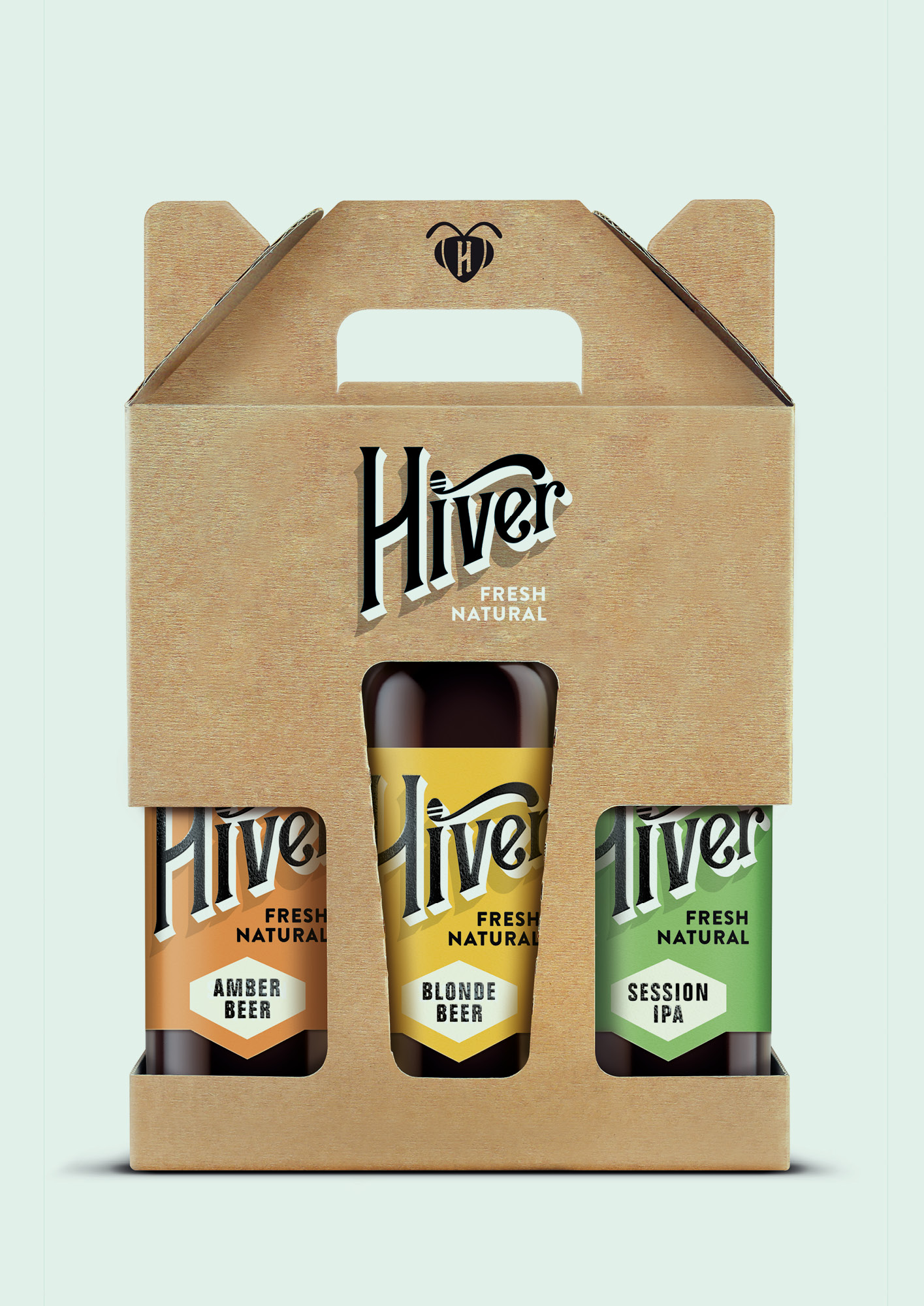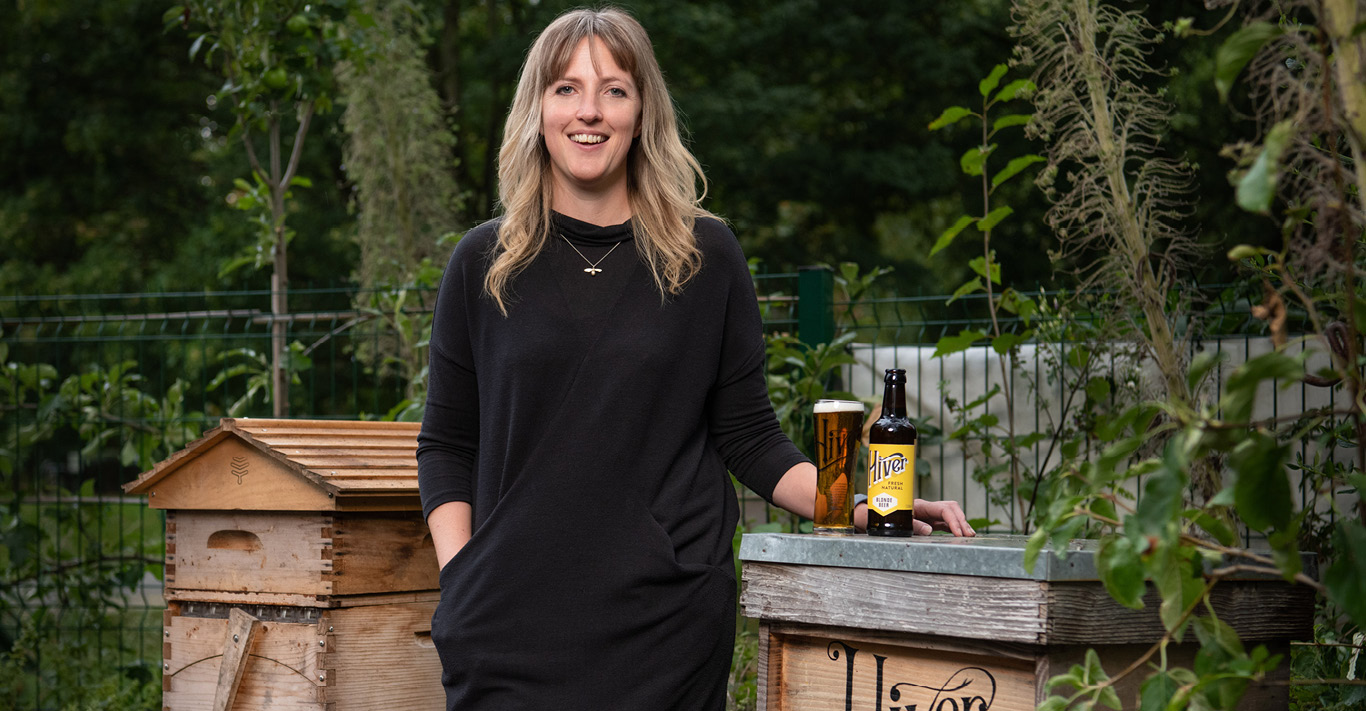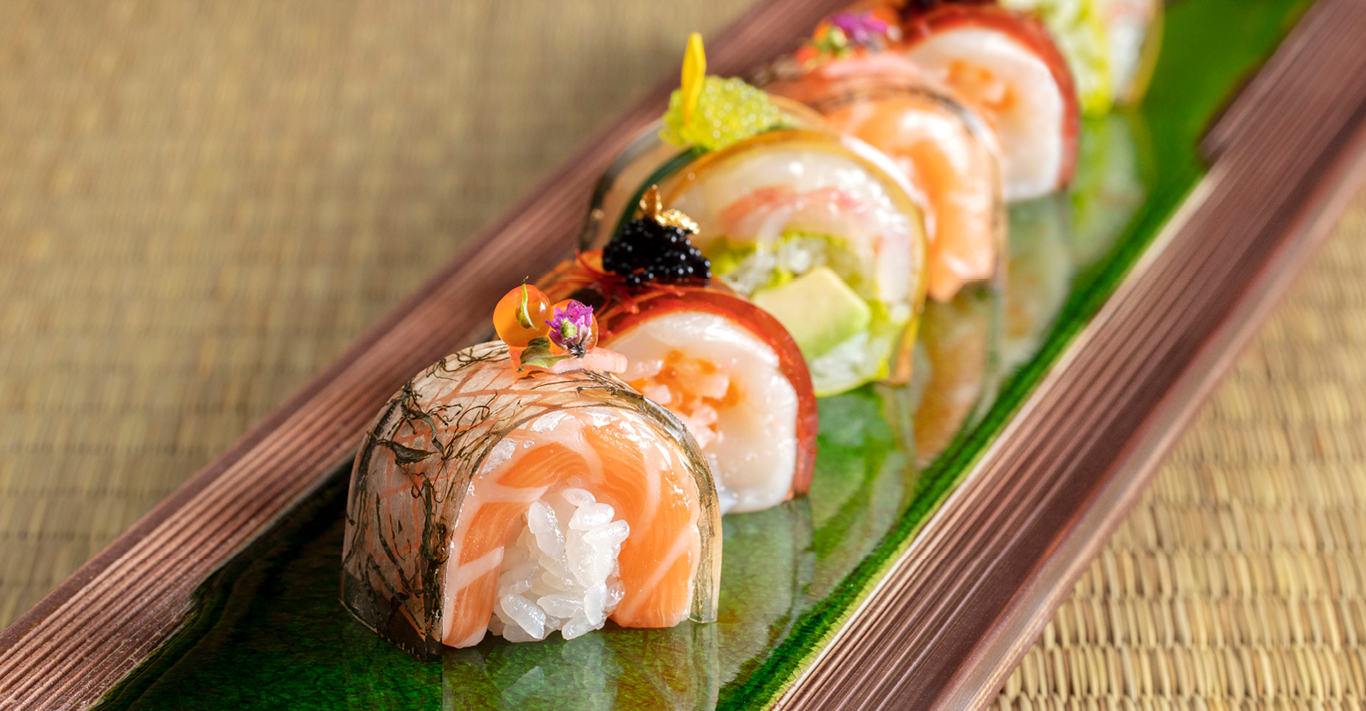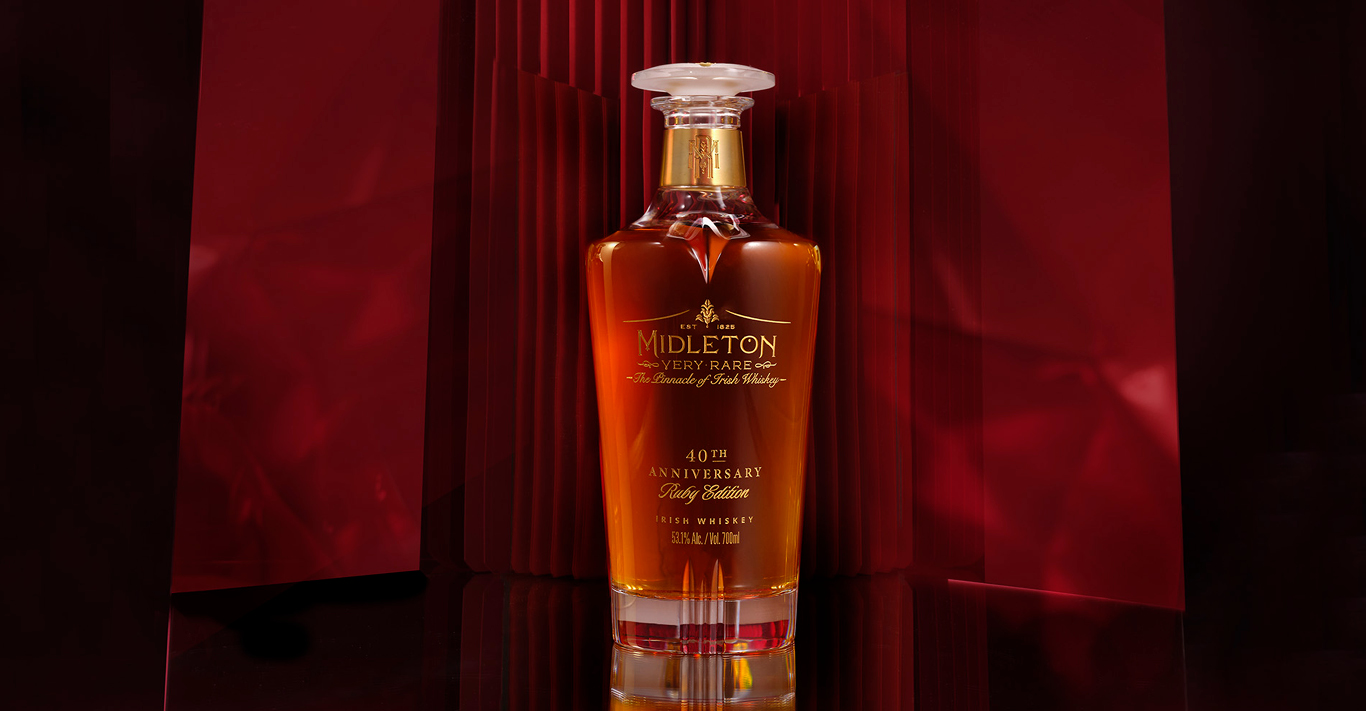WORDS
Jane Fulcher
Why did you start brewing honey beer?
I’ve always been a fan of sustainable produce and when I first moved down to London from Hull about 20 years ago it was my chance to explore that further. The great thing about London was that it had an emerging scene of networks and groups interested in sustainability and I quickly joined the Slow Food UK organisation. It was this interest in sustainable produce that ultimately led me to find out more about honey as a product, especially urban honey. I went on a little urban beekeeping course in Bermondsey, which was very hands on, and I just fell absolutely in love with it. I’ve also always been into nature. And when I look back I realise that I’ve always really enjoyed things that you can get hands-on with, like beekeeping.
My first job in London was working for a brewery doing tastings and so I’d already worked in beer for a number of years at this point. I knew what good quality beer meant to me and had been involved in recipe development for the brewery. One of the things I love about brewing is that it’s very creative. At the recipe development stage you really are hands on with your ingredients – you’re tasting and trying to make it work. As I found out more about honey as a product and it being a natural sugar, I thought it would be interesting to brew with it. It would obviously ferment, but what would happen? The more research I did, the more I realised that there’s a beautiful tradition of brewing beer with honey in the UK. So I wondered about doing a modern interpretation of brewing properly with honey, by which I mean fermenting with the honey and not adding it as a sweetener at the end.

Can you describe how the honey affects the flavour of Hiver beer?
Honey is a natural sugar. In normal beer it’s natural barley sugars that we want to give a yeast access to in order to convert it into alcohol during brewing. Honey is a very true and simple form of natural sugar, so the yeast can race through that quite quickly. If you add it at the end the honey will just sit as a sweetener. We also add the honey during a cooler part of fermentation and don’t pasteurise it, so we’re not boiling the lovely esters of the raw honey away. We have three styles of beer and the honey we use to brew and ferment that style will be the one that normally comes across on the nose. For the Honey Blonde beer, we use Yorkshire heather honey, which is quite floral and earthy on the nose and urban London honey, that tends to be a little bit citrusy, a great match for the citrusy hops we use. The Honey IPA is fermented with raw tree ivy honey, which bees can only forage once it’s 15 years old. The honey is incredibly rich and bitter – we love it, it gives the beer a lovely honey aftertaste as well as complimenting the bitterness of the hops. The Honey Ale uses raw Warwickshire blossom honey that brings a rich fruitiness to the beer.
Which foods would you recommend pairing Hiver beers with?
We were very lucky that from the very start some of our most high-profile customers were pairing Hiver with food. Restaurants such as Tom Kerridge’s The Hand and Flowers and amazing Michelin-star restaurants around the country were serving Hiver, which was incredibly flattering and humbling, and was also really cool because it meant that we got to work with the chefs on great food matching. That was a lovely experience and a real highlight for me in the early years. Some people do like to pair Hiver beers with something sweet but my preference has always been something a bit more salty or savoury with any of the range. So it could be as simple as black olives or black olive tapenade, and some Manchego. It also works really nicely with salted meat and roast chicken. The Ale works well with mature cheeses and fruit cake and even something like Malaysian or Thai curries will pair really nicely. It’s strong enough to connect with a more complex dish. I really love chilli prawns or something with satay with the IPA and it also pairs well with goat’s cheese, dried meat and charcuterie.
You source all of the ingredients from the UK, is that correct?
Yes, everything is sourced within the UK, including the packaging. Since I started the business it’s been really important and one of the things I’m really proud of is we’ve kept that ethos. It’s something that’s really important to the team as it has grown, too. We definitely get the support of customers who want to buy English and local produce and it felt really important to me that if people do that for us, we should be doing that for our supply chain. At its most simple level, we should be supporting other independent UK businesses and I don’t think we should be shipping beers and all the glass around the world because it’s a little bit cheaper. I think the exception is that while we buy English glass those are not independent businesses – glass production is quite a big industry. But our label manufacturers are an independent family-run business and working with people like that makes it really nice to go to work. The good relationships with our suppliers have been so important over the past seven months.
Can you tell us a bit more about how you source your honey?
When we started we worked with just one or two beekeepers and as the business has grown we have used the British Beekeepers Association to expand our network. So we tend to put an advert out through them maybe once a year saying we’re looking for honey from a new harvest. We then talk to the beekeepers to describe the honeys we use and their flavour profile and if we’re talking to an independent beekeeper, they will tell us about the source of forage for their bees. The forage type is indicative of the flavour of the honey, and we’d then taste that honey against our control samples. By doing that we can search for beekeepers all over the country but make sure that any differences from one harvest to another are allowed for by tweaking the recipe or just taste testing against our control vectors.
Honey can have the same forage but be different by region. Scottish heather honey is very fudge-like, for example, whereas Yorkshire honey tends to have a real medicinal note. So around September every year we’re doing all the taste testing from different beekeepers in order to buy in bulk because it is a seasonal product that is only harvested once or twice a year. We might buy just one or two kilos from an urban beekeeper, and for others it might be a ton at a time. We store it across the winter, and then we brew the beer and we bottle it. Then it’s on sale to customers, including now in Waitrose and Sainsbury’s. We try to give back too – we donate 10 per cent of profits to pollinator charities and support wildflower planting days run by local beekeeping organisations, such as the London Beekeepers Association.
Sustainability seems to really be at the core of Hiver. Would you say that’s true and how have you ingrained sustainability into what you do?
I think it is a journey that we’re still on. There’s always something extra you can do. As the team has grown, it’s been amazing to see which bits of the business have attracted our new members and what they’ve been really passionate about. The downtime this year has also made it possible for us to think about sustainability more. We’ve just launched our new branding, and we’ve finally moved away from labels that have any toxic ink in them. Something little like that wasn’t possible a couple of years ago, but it is now, and we’re able to bring that into the new designs. Earlier in the year we created a seat on the advisory board that represents sustainability so that we’re talking about it at all levels. I find if we’re not talking about something at advisory board level, it won’t become an agenda item for the day-to-day running of the business.
We were very lucky to get a spot as an SME with Heart of the City in London. They are an organisation that gives you a free foundation year to help you develop your sustainability strategy. You have to show that you’ve already got a foundation in sustainability and a desire to move forward with it. They helped us identify lots of new ways the business can be more sustainable. And as silly as it sounds, that started with changing our electricity supply and we saw how much the little things can help. So Hiver definitely has a good foundation. But there’s more we can do and I feel proud that we’re still taking those steps forward.
There still aren’t that many women in the drinks industry – how has your experience been as a woman in brewing?
On the one hand, the drinks industry is incredibly friendly and supportive. I think it has its own challenges, and there’s definitely networks and cliques within it, especially in the more old school side of the industry. We always felt really welcomed and, and perhaps in some ways because you’re in the minority, it helps you be more memorable. I don’t think it’s limited opportunities, but in the early days I didn’t always feel included – but that’s definitely changing. One of the things we had planned this year was a unisex netball tournament. Unfortunately we had to cancel it because of Covid-19 restrictions but those things are important. It is great for people to come together and have fun, but they need to be more inclusive. I would love to see more women getting involved in brewing, apart from anything it’s really fun! There are some incredible roles, varying from marketing to recipe development and much more. You get people from all backgrounds and I would love to see women better represented. One thing we have found is that as the business has grown, we have spoken to more corporate or larger organisations, such as Waitrose, Sainsbury’s or Nando’s, and those businesses have been incredibly modern; there are always women involved in our conversations.
What do you hope is next for Hiver?
We’ve been really excited about these new stockists and being in supermarkets, but that does come with challenges. We have to compete with the big, established brands and on a shelf rather than table environment. That’s part of the reason we’ve rebranded, to stand out on the shelves and communicate the words we found customers liked to associate with Hiver, like natural and fresh. We’re also hoping to concentrate more on our experiences, such as beekeeping days, which have been difficult this year for obvious reasons. We also launched a new English lager called Fabal earlier in 2020 – so far it’s mainly been on our own site but it’s also the house beer at The Dorchester. In fact, in terms of hopes and dreams, what I’d really like to do is enjoy a beer at The Dorchester!




